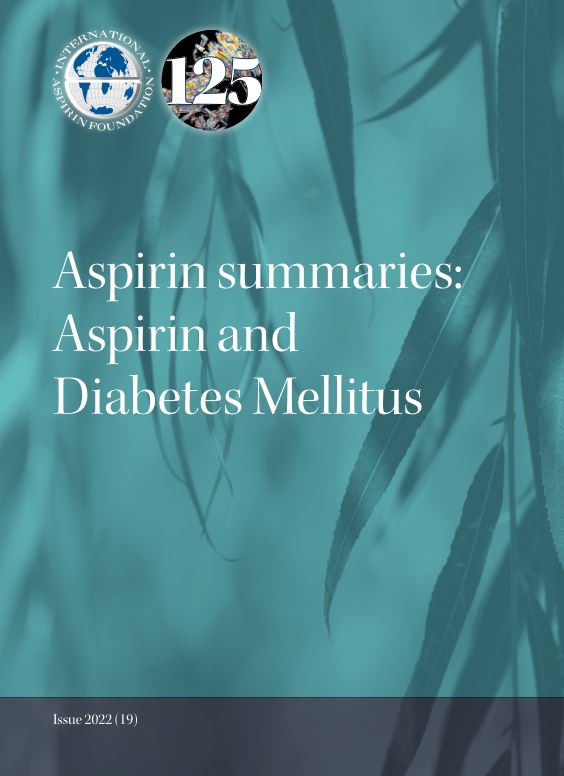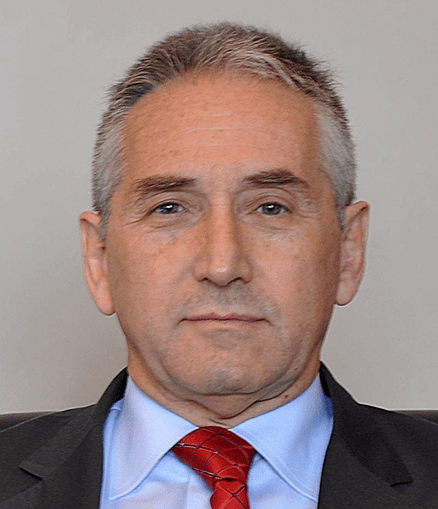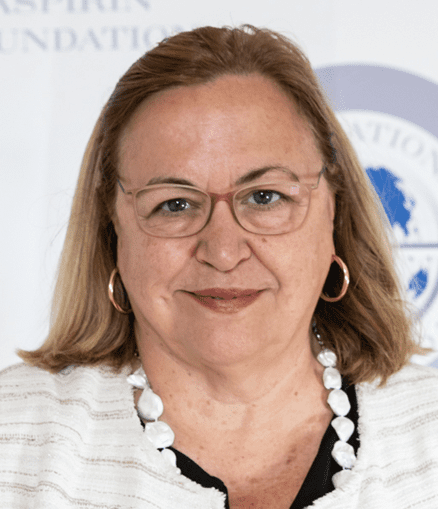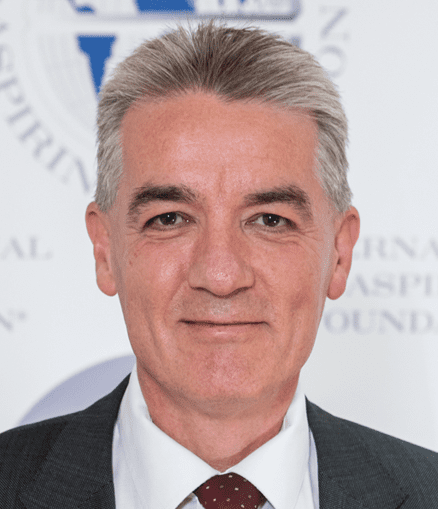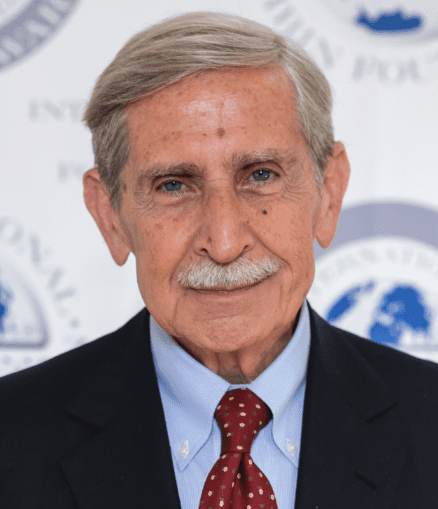Aspirin Summaries Issue 19 : Aspirin and Diabetes Mellitus
People living with Diabetes Mellitus (DM) have at least double the risk of developing cardiovascular disease (CVD). This is due to changes in the biochemistry of the body that results in a more inflammatory environment and greater platelet accumulation. Aspirin inhibits platelets and thus reduces the risk of a clot forming1. Vascular complications of DM resulting from a prothrombotic milieu and both premature and more severe vascular disease is the main cause of mortality and a significant cause of morbidity2.
Current guidelines recommend considering low-dose aspirin for the primary prevention of CVD in those at high CVD risk where there are no contraindications3,4. The co-prescription of a proton pump inhibitor can also be considered to help reduce the risk of a gastric bleed3.
“the best way to use aspirin for the primary prevention of CVD in patients with DM is to discuss individualized risks and benefits and make joint decision5”
Those with DM and symptomatic CVD should be treated the same as other secondary prevention patients with aspirin and other antiplatelet/ antithrombotic agents used as appropriate3,4.
References
1. Tan SY, Cronin H, Byrne S et al. Appropriateness of aspirin prescribing for primary and secondary prevention of cardiovascular disease in type 2 diabetes in different care settings. Irish Journal of Medical Science. 2021 https://doi.org/10.1007/s11845-021-02649-5
2. Ajjan RA, Kietsiriroje N, Badimon L et al. Antithrombotic therapy in diabetes: which, when and for how long? European Heart Journal. 2021; 42; (23): 2235-2259 https://doi:10.1093/eurheartj/ehab128
3. Cosentino F, Grant PJ, Aboyans V et al. 2019 ESC Guidelines on diabetes, pre-diabetes, and cardiovascular disease in collaboration with the EASD. European Heart Journal. 2020; 41: 255-323 https://doi:10.1093/eurheartj/ehz486
4. American Diabetes Association. Cardiovascular disease and risk management: standards of medical care in diabetes -2021. Diabetes Care 2021; 44; (S 1): S125-S150 https://doi.org/10.2337/dc21-S010
5. Papazafiropoulou AK, Melidonis A and Antonopoulos S. Aspirin in primary prevention of cardiovascular disease in diabetes. Arch Med Sci Atheroscler Dis 2021;6:e109-e114 https://doi.org/10.5114/amsad.2021.105596
Aspirin and primary CVD prevention in Diabetes Mellitus
This paper reviews current guidelines and research studies to set the scene for aspirin and primary CVD prevention in DM. The authors look at previous research and the more recent ASCEND study in which the cardiovascular benefit of aspirin was recognised but was potentially outweighed by the increased risk of bleeding side effects. They set this information within the context of DM now reaching epidemic proportions worldwide with a very clear increase in CVD among those with diabetes when compared with those without the disease. Solutions are needed to help reduce the impact of DM on morbidity, mortality and quality of life for those living with the disease and this is what the authors seek to analyse and address.
The authors make a careful assessment of the evidence and guidance to date and call for tools to help improve risk stratification for aspirin use in the primary prevention of CVD in those with DM. They also highlight the need to tackle other CVD risk factors such as hypertension and dyslipidaemia and improve lifestyle interventions such as diet and exercise.
The authors conclude that decisions to use aspirin for primary CVD prevention in people with DM is best made on an individual basis with a discussion of both the risks and the potential benefits.
For further information please see:
Papazafiropoulou AK, Melidonis A and Antonopoulos S. Aspirin in primary prevention of cardiovascular disease in diabetes. Arch Med Sci Atheroscler Dis 2021;6:e109-e114 https://doi.org/10.5114/amsad.2021.105596
The impact of low serum albumin levels on aspirin efficacy in people with DM.
In this study the authors explore the increased risk of CVD in those with Type 2 Diabetes Mellitus (T2DM) and the potential role of antiplatelet medication to mitigate this risk. The effectiveness of low-dose aspirin therapy for people with DM appears to be reduced by pharmacological factors such as an increased platelet turnover which might be compensated for by a twice daily dosing regimen but as the authors point out this needs testing in clinical trials.
Other factors may also play a role in the efficacy of low-dose aspirin for CVD prevention in people with DM. In this observational cohort study, the authors assess whether the antiplatelet effect of aspirin is impaired by hypoalbuminemia (low serum albumin levels). The investigators aimed to find out if low albumin levels were associated with a decrease in aspirin efficacy and outline evidence from previous research that suggest albumin dose dependently inhibits platelet aggregation and that serum albumin <3.5 g/dL is linked with an increased risk of thrombosis.
Serum albumin may be lower in those with DM for a variety of reasons including coexisting kidney disease, liver disease and infections. In this study 41% of the participants had a serum albumin level less than 3.5g/dL demonstrating the prevalence of hypoalbuminemia in this population.
The study follows 612 people with DM treated with low-dose aspirin (100mg/day) for 54.4 +/- 7.3 months. The primary end point, a composite of cardiovascular events, was analysed according to baseline serum albumin values of greater than or equal to 3.5g/dL or less than 3.5g/dL. The results showed that hypoalbuminemia was associated with a greater risk of having a cardiovascular event and they found that in those with low albumin levels COX-1 inhibition was impaired despite aspirin therapy.
The authors conclude:
“This study gives new insights to the understanding of the reduced effectiveness of aspirin in T2DM and provides a rationale for an interventional trial to assess if albumin supplementation may improve aspirin responsiveness and positively affect the risk of experiencing a future cardiovascular event.”
For further information please see:
Sciacqua A, Andreozzi F Succurro E et al. Impaired clinical efficacy of aspirin in hypoalbuminemic patients with diabetes mellitus. Front. Pharmacol. 22 June 2021 https://doi:10.3389/fphar.2021.695961
Ticagrelor and aspirin in people with DM and established coronary artery disease
In this article the impact of dual antiplatelet therapy with ticagrelor and aspirin is explored in people with DM and stable coronary artery disease (CAD) who have not had a myocardial infarction (MI) or stroke.
THEMIS was a phase 3b, double-blind, placebo-controlled trial across 1,315 sites in 42 countries and was carried out between February 2014 and May 2016. The study recruited 19,220 individuals with CAD proven on an angiogram and DM but without a prior MI or stroke. Participants were randomised to receive ticagrelor or placebo in addition to low-dose (75-150 mg) aspirin for a median follow up of just under 40 months.
The results showed that aspirin plus ticagrelor did reduce the incidence of major adverse cardiovascular events (MACE) independent of baseline antihyperglycemic therapy, HbA1c or diabetes duration but that this combination did increase the risk of bleeding events. They found there was a net clinical benefit in the THEMIS PCI sub analysis population but not the overall THEMIS population indicating that a favourable net clinical benefit could be found in those who had undergone a previous percutaneous coronary intervention (PCI). The number of people on novel antihyperglycemic agents was low reducing the ability to understand any potential treatment interactions with these newer medications.
The authors suggest that:
‘Future studies should evaluate the safety and efficacy of dual antiplatelet therapy with ticagrelor plus aspirin in patients with diabetes taking new classes of antihyperglycemic agents.’’
For further information please see:
Leiter LA, Bhatt DL, McGuire DK et al. Diabetes-related factors and the effects of ticagrelor plus aspirin in the THEMIS and THEMIS-PCI trials. J Am Coll Cardiol. 2021;77(19): 2366-2377. https://doi.ord/10.1016/j.jacc.2021.03.298
Risk stratification and screening for coronary artery disease (CAD) in people with no symptoms of CAD with DM
This French Society of Cardiology and French-speaking Society of Diabetology position paper, brings together cardiologists, diabetologists and CV imagers to sets out criteria for a more precise risk stratification approach to DM and CVD risk in order to better manage and plan medication strategies and goals. They propose that, while it’s important to avoid the risk associated with screening and potential overtreatment in the moderate CVD risk DM population, some extra investigations may be warranted in high-risk populations in order to better define the risk and plan management.
The paper contains an algorithm to help clinicians stratify risk and plan management for people with DM who have no symptoms of CAD. Using initial information gathered from medical history, family history of premature CAD, DM duration, clinical examination, eye screening and basic tests such as ECG and the usual blood and urine tests patients can be screened for high-risk parameters. For those at high-risk additional information from a coronary artery calcium score is proposed in order to further plan risk stratification and treatment. Cardiology advice and coronary angiography may then be used for those that are found to have a very high risk of ischemia or are suspected of having a significant level of CAD
The paper explores the pathophysiology that leads to increased CVD risk in DM including accelerated platelet turnover and an abnormal response to antiplatelet therapy. They review the evidence for anti-platelet therapy in DM and suggest that whilst low-dose aspirin use cannot be recommended for primary CVD prevention in all patients with DM, for those with high or very high CAD risk low-dose aspirin can be considered if bleeding risk is low. The authors point out the need for studies looking at the role of low-dose aspirin in patients with DM and subclinical coronary atherosclerosis. In people with high body weight aspirin appears less effective and has less bleeding risk giving another area for further investigation. The paper also states that clopidogrel does not appear to be more effective than aspirin in people with DM again making the need for more research into aspirin important. The position paper highlights aspirin use in those at high or very high risk as defined by the papers algorithm as being an important knowledge gap that requires further evaluation.
The authors state:
“Coronary risk stratification should be considered as a critical step to decide whether or not to perform CAD screening, and to define therapeutic goals and optimal treatments.”
For further information please see:
Valensi P, Henry P, Boccara F et al. Risk stratification and screening for coronary artery disease in asymptomatic patients with diabetes mellitus: Position paper of the French Society of Cardiology and the French-speaking Society of Diabetology. Diabetes Metab. 2021; 47 (2): 101185 https://doi.org/10.1016/j.diabet.2020.08.002
Antiplatelets in DM for the primary and secondary prevention of cardiovascular disease.
In this article an appraisal of 15 guidelines was conducted to highlight the areas of consensus and the controversies surrounding antiplatelet use for primary and secondary CVD prevention.
They found the guidelines generally recommended the use of dual antiplatelet therapy (DAPT) within twelve months in patients with DM who had acute coronary syndrome (ACS) or who had undergone PCI/CABG with long term low-dose aspirin use. They highlight the fact that guidelines differ on their advice around prolonging DAPT beyond the 12-month period in this group of patients mainly due to insufficient evidence.
In primary CVD prevention the use of aspirin is not recommended for those patients with DM at moderate or low CVD risk, but the role of low-dose aspirin in high CVD risk patients is recognised in a number of guidelines especially as gastroprotective strategies such as a proton pump inhibitor (PPI) can be used to reduce bleeding risk. The authors also recommend further work on whether patients with poor diabetic control may benefit more from low-dose aspirin for CVD prevention.
The authors note a great deal of variation in guidelines development and recommend the use of rigor scores to assess their strength and to also look at consensus across guidelines. They suggest their article reviewing the current guidance on DM and antiplatelets will also be of use to those developing future guidelines
The authors conclude:
“We encourage physicians to use the guidelines with higher AGREE II rigor scores and explicit disclosure of COI for deciding on the antiplatelet strategy for type 2 diabetes patients, and fully understand the consensus of current guidelines.”
For further information please see:
Liu M, Zhuang X, Chen X et al. Antiplatelet strategy in primary and secondary prevention of cardiovascular disease in patients with type 2 diabetes mellitus: A perspective from the guideline appraisal. J Diabetes Investig. 2021;12(1):99-108. https://doi.org/10.1111/jdi.13324.
State of the art review – antithrombotic therapy in diabetes mellitus
This review explores the latest research in the antithrombotic management of DM including both primary and secondary prevention strategies. The article looks at different secondary prevention scenarios including coronary, cerebrovascular and peripheral artery diseases. The article reviews the evidence for different antiplatelet therapies as well as antiplatelet and anticoagulant regimes for both acute and long-term care. They also look at the evidence for managing patients who have a normal sinus heart rhythm versus those who have atrial fibrillation.
The authors review the issues with tailoring antithrombotic therapies according to CVD risk, DM duration, the presence of complications of DM and risk of bleeding. The paper also highlights areas for future research.
They explore the science behind DM and increase CVD risk in detail and point out that the exact mechanisms behind both the increased thrombotic and the increased bleeding risk in DM are not fully understood but that renal complications may be involved with this.
With regards to the role of low-dose aspirin in DM the authors suggest that because aspirin has a short half-life and people with DM have a higher platelet turnover a twice daily dosing regimen may be needed to prevent a proportion of the platelets escaping 24-hour inhibition with once daily regimens.
With regards to secondary CVD prevention aspirin appears to offer similar benefits in people with and without DM. Work is ongoing to see if twice daily or other alternative aspirin dosing regimens bring benefit.
The authors recommend more DM specific randomised controlled studies to investigate the best antithrombotic strategies for people living with this disease. The complexities with antithrombotic risk and bleeding side effects in DM need to be considered as these vary over time and with the development of diabetic complication such as renal disease. There is a need for reliable biomarkers and/or an in silico model in order to be able to help predict thrombotic risk and the potential response to treatment. They call for greater collaboration between metabolic and vascular disciplines in order to design trials that will improve outcomes in the DM population.
The current body of evidence suggests aspirin can be considered for primary prevention in those with a high CVD risk. For secondary prevention dual therapy is useful with DAPT with aspirin and either ticagrelor or prasugrel for at least 12 months in acute coronary syndrome (ACS). In stable atherosclerotic disease, especially where there is peripheral artery disease (PAD) aspirin and very-low-dose rivaroxaban is recommended. After a stroke the presence of atrial fibrillation (AF) and whether reperfusion has been needed will guide the choice of antithrombotic therapy,
The author concludes:
‘A key difficulty remains the lack of bio-marker(s) that accurately predict thrombotic/bleeding risk and response to therapy.’
For further information please see:
Ajjan RA, Kietsiriroje N, Badimon L et al. Antithrombotic therapy in diabetes: which, when and for how long? European Heart Journal. 2021; 42; (23): 2235-2259 https://doi:10.1093/eurheartj/ehab128
Disclaimers:
• The information, views and opinions expressed are not endorsed or approved by members of The Scientific Advisory Board unless otherwise stated.
• The Information section is compiled using current published information at the time of writing and whilst every effort has been made to avoid errors, professional clinical judgement is required to interpret the information given. The information given is referenced clearly for further analysis as required.
• Every effort is made by the International Aspirin Foundation to see that no misleading or inaccurate data, statement or opinion appear. The International Aspirin Foundation cannot be held responsible for any errors or for any consequences arising from the use of the information.
• The International Aspirin Foundation, its associates and The Scientific Advisory Board accept no liability whatsoever for the consequences of any such inaccurate or misleading data, information, opinion or statement.
• Any information involving drug usage, should only be followed in conjunction with the drug manufacturer’s own published literature in their own country.
• Medical sciences evolve on a continual basis and therefore independent verification of the content should be made.
• The information, views, opinions and any other material provided should not be relied upon as a substitute to professional medical advice in relation to any medical condition. The International Aspirin Foundation, its associates and The Scientific Advisory Board accept no liability whatsoever for any consequences arising from any reliance placed on such information, views, opinions and other materials in lieu of professional medical advice.

